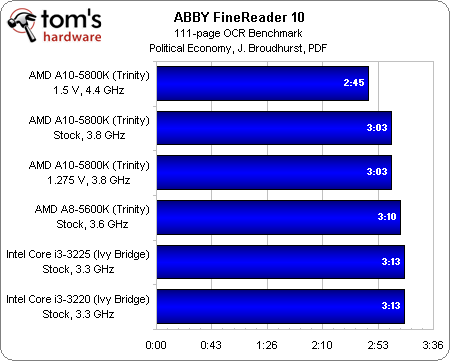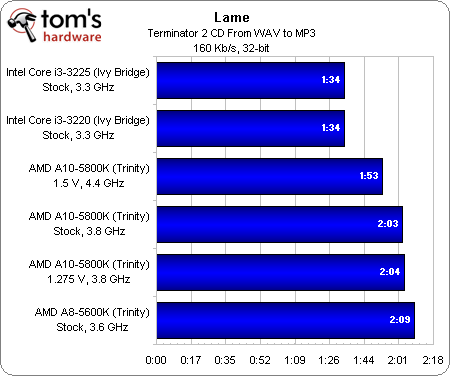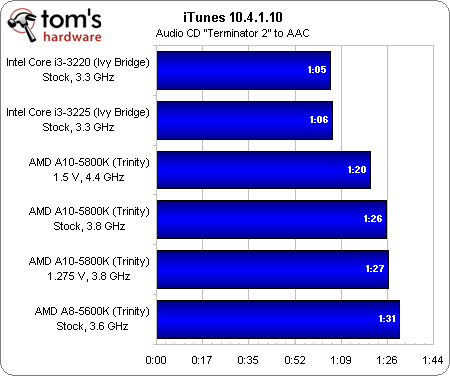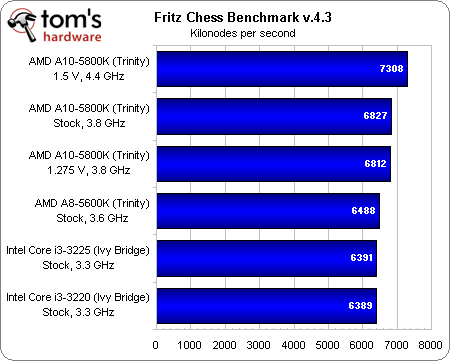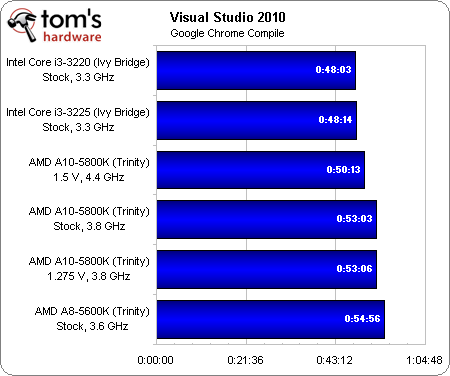AMD's Trinity APU Efficiency: Undervolted And Overclocked
We've been playing with AMD's Trinity APUs for four months, and they're just now being rolled out to the channel. This time, we take a look at the architecture's efficiency compared to a pair of Ivy Bridge-based Core i3s. Can A10 and A8 stand up to Intel?
Benchmark Results: Productivity
This well-threaded optical character recognition task hands AMD’s A10 and A8 a victory that gets extended through overclocking. Intel’s Core i3 are effectively not overclockable, so what you see is what you get.
The Ivy Bridge-based parts don’t need a clock rate advantage in single-threaded benchmarks, though. A file conversion from WAV to MP3 formats in Lame uses just one core in each chip, again illustrating how much work each Core i3 core can get done per clock cycle. If only these were quad-core parts…
There’s a similar situation in iTunes, where even a boost to 4.4 GHz leaves the A10-5800K behind Intel’s 3.3 GHz Core i3-3225 and -3220.
The AMD APUs come out ahead in Fritz, which could be due to a combination of higher clock rates, more cache, and improvements to how branch midpredicts are handled.
In AMD Desktop Trinity Update: Now With Core i3 And A8-3870K, we saw interesting results from Visual Studio 2010. First of all, A8-3870K scored a first-place finish, letting us know that the old Stars-based architecture is able to outmaneuver Trinity’s Piledriver x86 cores in specific tasks.
Also, the Sandy Bridge-based Core i3-2100 managed to edge out A10-5800K. It comes as no surprise, then, that a Core i3 centering on Ivy Bridge and running 200 MHz faster extends Intel’s lead in this very real-world benchmark.
Even overclocked to 4.4 GHz, the A10-5800K can’t quite keep up.
Get Tom's Hardware's best news and in-depth reviews, straight to your inbox.
Current page: Benchmark Results: Productivity
Prev Page Benchmark Results: Content Creation Next Page Benchmark Results: Compression Utilities-
esrever Most PC are idle or semi idle when people have them on. 90% of the time I use my PC, I do web surfing or watch video or a text editor for work, my pc is not loaded with benchmarks 24/7. If you look at idle power consumption, the trinity APUs are amazing. They easily beat out intels offerings. If you are looking at the power consumption over a month, the trinity will be much more energy efficient than the i3 for most people.Reply
-
tacoslave man getting this in a 17inch laptop with a 12 cell battery would make it an instabuyReply -
mayankleoboy1 ReplyIn the end, then, both Intel and AMD are offering you an experience. Which one do you pick?
At this price point, i would choose AMD Trinity. -
cangelini esreverMost PC are idle or semi idle when people have them on. 90% of the time I use my PC, I do web surfing or watch video or a text editor for work, my pc is not loaded with benchmarks 24/7. If you look at idle power consumption, the trinity APUs are amazing. They easily beat out intels offerings. If you are looking at the power consumption over a month, the trinity will be much more energy efficient than the i3 for most people.Happy to set a couple of systems up and let you know what I find.Reply -
mayankleoboy1 AMD should team up with developer of 7zip to accelerate it on APU's. That will make Trinity look better. A lot of people use 7zip. And most of the installation setup exe files are compressed using LZMA algorithm.Reply -
mayankleoboy1 Chris, it would be great to see some benchmarks of applications that uses the new FMA3 instructions of the Piledriver.Reply -
cangelini esreverMost PC are idle or semi idle when people have them on. 90% of the time I use my PC, I do web surfing or watch video or a text editor for work, my pc is not loaded with benchmarks 24/7. If you look at idle power consumption, the trinity APUs are amazing. They easily beat out intels offerings. If you are looking at the power consumption over a month, the trinity will be much more energy efficient than the i3 for most people.So, it's probable that we're seeing a difference in configuration. It looks like Anand is using the Gigabyte A85X board and perhaps an older driver version. I'm on the MSI board and Cat 12.8, with a different Intel setup as well. On the Windows desktop, after 10 minutes on each config, I get 59 W for Intel and 67 W for AMD at idle.Reply -
techcurious Chris, for the sake of completeness, any chance you could undervolt the i3-3225 at stock speeds and run the power consumption/efficiency tests on it? ;) ...to reveal how low the i3 can be pushed with some tweaking as well, and create the opportunity for a more fair comparison with the undervolted Trinity results.Reply -
sarinaide Thanks Chris, another great article to pass time over. You really need to comment on the forums more and more so to help out against the blatent belligerence against what AMD are trying to achieve and how they are looking to achieve it.Reply
Hopefully this articale can start to filter around particularly for the budget users which A-series is premised to target.
